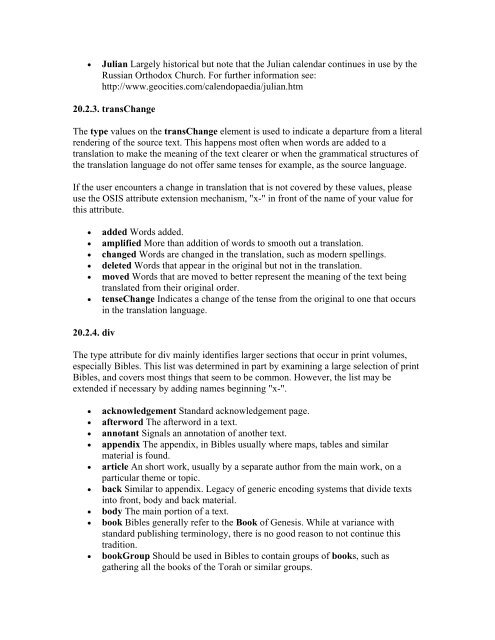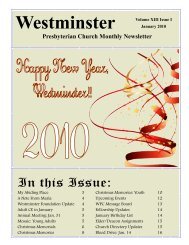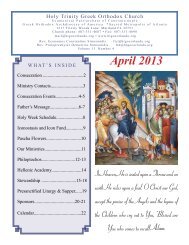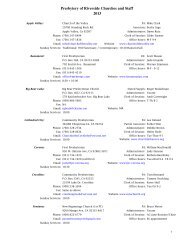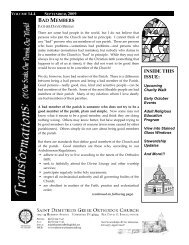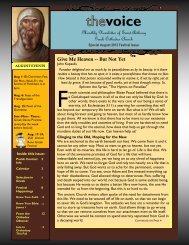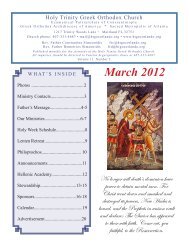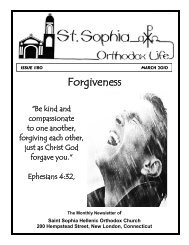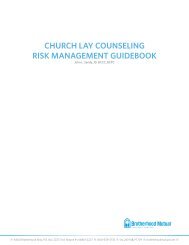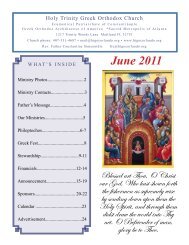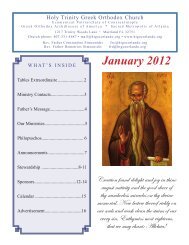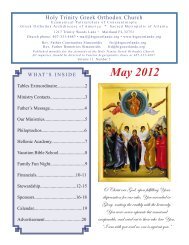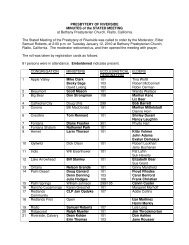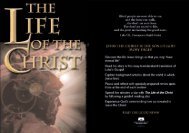OSIS? 2.0.1 User's Manual - Web services are running on AMBIB
OSIS? 2.0.1 User's Manual - Web services are running on AMBIB
OSIS? 2.0.1 User's Manual - Web services are running on AMBIB
You also want an ePaper? Increase the reach of your titles
YUMPU automatically turns print PDFs into web optimized ePapers that Google loves.
• Julian Largely historical but note that the Julian calendar c<strong>on</strong>tinues in use by the<br />
Russian Orthodox Church. For further informati<strong>on</strong> see:<br />
http://www.geocities.com/calendopaedia/julian.htm<br />
20.2.3. transChange<br />
The type values <strong>on</strong> the transChange element is used to indicate a departure from a literal<br />
rendering of the source text. This happens most often when words <str<strong>on</strong>g>are</str<strong>on</strong>g> added to a<br />
translati<strong>on</strong> to make the meaning of the text cle<str<strong>on</strong>g>are</str<strong>on</strong>g>r or when the grammatical structures of<br />
the translati<strong>on</strong> language do not offer same tenses for example, as the source language.<br />
If the user encounters a change in translati<strong>on</strong> that is not covered by these values, please<br />
use the <str<strong>on</strong>g>OSIS</str<strong>on</strong>g> attribute extensi<strong>on</strong> mechanism, "x-" in fr<strong>on</strong>t of the name of your value for<br />
this attribute.<br />
• added Words added.<br />
• amplified More than additi<strong>on</strong> of words to smooth out a translati<strong>on</strong>.<br />
• changed Words <str<strong>on</strong>g>are</str<strong>on</strong>g> changed in the translati<strong>on</strong>, such as modern spellings.<br />
• deleted Words that appear in the original but not in the translati<strong>on</strong>.<br />
• moved Words that <str<strong>on</strong>g>are</str<strong>on</strong>g> moved to better represent the meaning of the text being<br />
translated from their original order.<br />
• tenseChange Indicates a change of the tense from the original to <strong>on</strong>e that occurs<br />
in the translati<strong>on</strong> language.<br />
20.2.4. div<br />
The type attribute for div mainly identifies larger secti<strong>on</strong>s that occur in print volumes,<br />
especially Bibles. This list was determined in part by examining a large selecti<strong>on</strong> of print<br />
Bibles, and covers most things that seem to be comm<strong>on</strong>. However, the list may be<br />
extended if necessary by adding names beginning "x-".<br />
• acknowledgement Standard acknowledgement page.<br />
• afterword The afterword in a text.<br />
• annotant Signals an annotati<strong>on</strong> of another text.<br />
• appendix The appendix, in Bibles usually where maps, tables and similar<br />
material is found.<br />
• article An short work, usually by a separate author from the main work, <strong>on</strong> a<br />
particular theme or topic.<br />
• back Similar to appendix. Legacy of generic encoding systems that divide texts<br />
into fr<strong>on</strong>t, body and back material.<br />
• body The main porti<strong>on</strong> of a text.<br />
• book Bibles generally refer to the Book of Genesis. While at variance with<br />
standard publishing terminology, there is no good reas<strong>on</strong> to not c<strong>on</strong>tinue this<br />
traditi<strong>on</strong>.<br />
• bookGroup Should be used in Bibles to c<strong>on</strong>tain groups of books, such as<br />
gathering all the books of the Torah or similar groups.


